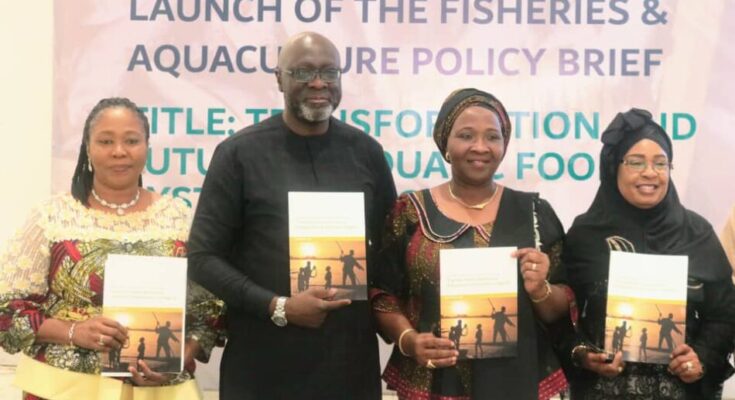

The Country Director, Global Alliance for Improved Nutrition (GAIN) Nigeria, Michael Ojo, has said that Nigeria loses 1.5 billion dollars in Gross Domestic Product (GDP) annually to micronutrient deficiencies.
This is just as he lamented that dietary inadequacies are one of the most pressing reasons for people experiencing multiple nutrient deficiencies and subsequent morbidity and mortality in Nigeria.
Speaking at the Launch of Fisheries and Aquaculture Policy Brief on Wednesday with the theme ‘Transformation and Future of Aquatic Food Systems in Nigeria’, Ojo said that Nigeria is plagued by a double burden of malnutrition, as undernutrition exists alongside overweight, obesity, micronutrient deficiencies, and associated diet-related non-communicable diseases.

The launch was organised by the Federal Ministry of Agriculture and Rural Development in partnership with Global Alliance for Improved Nutrition (GAIN), Global Panel on Agriculture and Food Systems for Nutrition (GLOPAN) and other partners.
Ojo said aquatic foods have considerable potential in helping to fill this nutrient gap and improve the quality of our diets.
“Nigeria loses 1.5 billion dollars in Gross Domestic Product (GDP) annually to micronutrient deficiencies, and dietary inadequacies are one of the most pressing reasons for people experiencing multiple nutrient deficiencies and subsequent morbidity and mortality in Nigeria”, he said.

The GAIN’s Country Director further stated that the Nigerian government is making efforts to transform the food systems to increase the production of safe and nutritious foods, but the diversity of aquatic foods and their potential to contribute to sustainable healthy diets and address the burden of malnutrition has been largely overlooked.

“Fish is particularly important in the diets of low-income households. Unlike other types of animal-source foods, dried small fish are often sold and purchased in small quantities, making them particularly accessible to consumers with limited purchasing power and refrigeration.
“Many studies have highlighted the nutritional importance of small fish, particularly when consumed whole with bones and viscera intact, for poor populations throughout the world.
“The process for developing the policy brief on “Transformation and Future of Aquatic Food Systems in Nigeria” started with a National Dialogue on Transformation and Future of Aquatic Food Systems in Nigeria that was held on 18th of July 2021, as part of the series of dialogues that informed Nigeria’s food systems transformation pathways delivered at the UN Food Systems Summit.
“Leading experts from across Nigeria who participated in the event proposed great ideas and innovations with the potential to catalyse and energise the fisheries and aquaculture sector. The most promising of these provided the foundation for the policy brief being launched today”, he added.
In his address, the Minister of Agriculture and Rural Development, Dr Mahmood Abubakar, said the aquatic environment is of utmost importance to the survival of mankind and the ecosystem, aside from providing human beings with food, it is also regulating our climate.
He said when he was posted as Minister of Agriculture, he tasked his team on how they can work to sustainably make agricultural products available to average Nigeria to improve nutrition and create jobs.
“Aquaculture as we are all aware is the fastest growing sector to increasing fish production and I have mandated the department to work towards increasing aquaculture production by an additional 250,000MT since I assumed office, this is to help us create an additional 1.1 million jobs in the sector.
“We are working towards this goal and I encourage everyone present at this launch to support this initiative. Let us also work together to protect the aquatic environment from the effects of pollution, overfishing, and climate change for the benefit of future generations”, he said.
The Minister who was represented by the Director of Special Duties in the Ministry, Fausat Lawal, said the new Policy document aims to serve as a guide to addressing the many challenges that the fisheries and aquaculture sector face in a comprehensive and coordinated manner in meeting the overall goal of making agricultural products available to the citizen at an affordable price.
“The attainment of this objective will require our collective participation at multinational, national and sub-national levels, non-state actors and development partners inclusive”, the Minister said.
He said the Federal Government is committed to working with all stakeholders in creating investment opportunities and helping our fisherfolks improve their livelihoods while creating decent jobs in the process.
“We recognise that the fishing industry is a significant source of livelihood for many communities, therefore, recommendations provided in this policy document ensure that all stakeholders collaborate to develop and implement sustainable fishing practices that protect marine biodiversity and ensure the long term viability of fish stocks,” he added.
READ ALSO FROM NIGERIAN TRIBUNE









